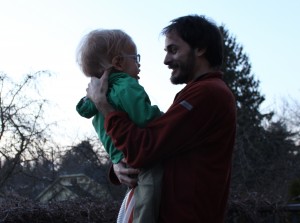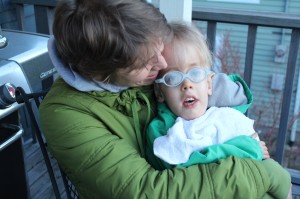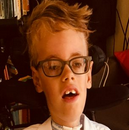Imagining the world of Lucas (March 11)
The other night we were laying in bed reading as Lucas fell asleep. It had been a good evening – Lucas was being goofy and hilarious, as he often is right before suddenly hitting the wall and announcing (reluctantly) that he’s ready for bed by stuffing his thumb in his mouth. Such was the case on this particular night, and after tucking him in and reading “Buglette the Messy Sleeper” — his favorite bedtime book — Krista and I were finally about to get some rest ourselves. But we couldn’t stop thinking about Lucas.
 It’s hard to explain how happy it makes us to see Lucas at his best, so pleased with himself and the world. Lucas’s energy can vary a lot, but when he’s on fire he can be incredibly resourceful, communicative and, as we’ve mentioned a lot recently, funny. His day-to-day life has become very “normal,” and enjoyable, in ways that lead us to sometimes forget that he has a severe neuromuscular disease.
It’s hard to explain how happy it makes us to see Lucas at his best, so pleased with himself and the world. Lucas’s energy can vary a lot, but when he’s on fire he can be incredibly resourceful, communicative and, as we’ve mentioned a lot recently, funny. His day-to-day life has become very “normal,” and enjoyable, in ways that lead us to sometimes forget that he has a severe neuromuscular disease.
And so it was that we ruminated that night about what Lucas’s life must be like for him… not with frustration or sadness but rather curiosity, and perhaps empathy. He seems so happy most of the time, and is totally content just directing us towards whatever it is he needs – “doggy book!”, “play the go-fish game!”, or “do the Caterpillar Ap on the iPad!” are among his favorite instruction these days. Depending on others to fulfill his needs and desires is all that he’s ever known, and of course all kids are dependent on their parents and caregivers during the first years of their lives. Yet Lucas is now three and a half, and though he’s not the most self-aware kid, he is very intelligent and observant and must be starting to notice that others around him don’t have to ask (repeatedly!) to get their favorite book… they just walk over and grab it.
We can observe and imagine what it must be like to grow up with muscle disease and not be able to access anything outside the 1 foot radius of your immediate reach. When Lucas is sitting up his muscle strength is so weak as to prevent him from doing much of anything physical, unless his arms are on a tray or table, in which can he can hold something in his hand or push an object around. If he’s lying down he can move his arms around a lot more, including behind him and above his head (it’s often surprising to observe some of the stuff he can reach.) His range of vision is also limited by his muscle disease, though he often has a sixth sense about what’s behind him or to the side. But ultimately he’s in a very vulnerable position because of all this; it’s not surprising that despite the fact that he loves dogs he freaks out when they get too close. If they make a quick move, he has no way of defending himself.
 There are other ways the effects of his disease play out. For example, Lucas has never identified hunger to us. He doesn’t seem to make the connection between “eating” — which for him involves having blended up food pushed through a tube directly into his stomach — and satisfying the hunger urge. He misses out on the pleasure of eating tasty food and can’t just grab a snack if he feels low on energy. We try to simulate typical eating practices but giving him four meals a day, three of them corresponding to the breakfast-lunch-dinner cycle. But it’s not the same.
There are other ways the effects of his disease play out. For example, Lucas has never identified hunger to us. He doesn’t seem to make the connection between “eating” — which for him involves having blended up food pushed through a tube directly into his stomach — and satisfying the hunger urge. He misses out on the pleasure of eating tasty food and can’t just grab a snack if he feels low on energy. We try to simulate typical eating practices but giving him four meals a day, three of them corresponding to the breakfast-lunch-dinner cycle. But it’s not the same.
And then you get beyond basic needs, to what is childhood really all about: playing, expending unbelievable amounts of energy, having fun. Here as well Lucas often misses out, especially on the physicality of childhood games – running, jumping, skipping, tumbling. We’ve surmised that his obsessive attention to books and learning is in part a result of being prohibited from such play, but perhaps this also contributes to the keen sense of humor that Lucas is developing. It’s how he amuses himself in the absence of doing all those physical things that other kids are out doing. Sometimes you can hear Lucas talking to himself for long stretches, playing around with the tone of his voice, repeating things he’s heard over and over again. It makes him so happy, and why not?
In light of all this, Lucas’s ability to communicate is hugely important. We feel blessed that he’s been able to develop speech in the way that he has — his voice is quiet and he’s difficult to understand, for sure, but compared to other kids with muscle disease, a trach and a vent, etc, he’s doing remarkably well. This is what allows him to fulfill his desires and needs: he tells us or his nurse things — or rather makes explicit demands — and we do what we can to make what he wants happen. For example, he often has to tell us to “pick up” his arm if it’s stuck in a position that won’t allow him to hold a book. (We should mention that like any kid he makes some unreasonable or ridiculous demands so we don’t always comply!)
If independence is the goal of many people with disabilities — and indeed a rallying cry of the disability rights movement over the last few decades — than what does it mean for someone like Lucas who will always be dependent on those around him? Many people with disabilities consider themselves independent if they can do most things on their own but require a personal assistant to bath, etc. But Lucas needs us or a nurse for much of what he does, including keeping his airway open so that he can breathe. Even when he finally gets up and running in a power wheelchair he’ll still have someone tagging along right behind him at all times; how strange to think about spending your whole life within earshot of another person.
Last year I read the amazing memoir Boy on the Moon by Ian Brown (Krista is reading it now) and was struck by our fortune in terms of how Lucas’s disability has manifested. Brown writes about his son who was born with an even rarer genetic disorder than MTM which leads him to be non-verbal, have severe developmental delays, and do things like punch himself in the face repeatedly. The life of he and his wife during their son’s first years is so much more difficult and gut-wrenching than anything we’ve been through. It’s a dangerous game to get into a hierarchy of disability challenges, but sometimes you can’t help it. While we often wish that Lucas were just a little bit stronger so that he could hold his head up on his own (like most kids with MTM) at the same time we constantly appreciate his ability to communicate, his intelligence, and his fun-loving demeanor.
At this point we’re used to being Lucas’s arms and legs — in fact we delight in being his caregivers — but we still wish to god he could go pick up books himself sometimes. We mostly live in the here and now of Lucas’s life, because contemplating what all this means for the future is too hard to really think about. And because we’re too busy being awed everyday by Lucas’s joy, curiosity, and playfulness in the face of such huge challenges.
On Sunday I spent the entire day alone with Lucas — Krista is out of town — and though I got tired at times, struggling to find fun things to do, I also smiled a lot, and marveled (again!) at what a great kid Lucas is becoming.


Comments (8)
Alexis
March 22nd, 2013 at 4:47 pm
Burke, I always knew you would be a great dad (I am recalling in particular a hilarious retelling of a story involving Madden shouting “blueberries!”) but you have some very special qualities as a parent, including your thoughtfulness, self-reflection, honesty and willingness to share all these feelings with all of us, not to mention a remarkably high tolerance for kids’ songs on repeat, considering your excellent musical tastes :)
colleen
March 14th, 2013 at 2:58 pm
Hey yous! it’s been awhile since i’ve posted anything- and reading this most recent entry prompted me to say that i think about you all— here in snowy CNY! it’s a crazy day with brilliant sunshine and wind that’ll clean out any cobwebs anywhere! (i think Jolie is doing some pre-spring cleaning). thank you so much for the amazing and insightful words you keep here… so much love out to you–miles de gracias, , companer@s! btw- i think i need to send you a new CD, yes?
Chris Damon
March 13th, 2013 at 7:27 am
Thanks for writing this Burke. So much of life consists of keeping it all in perspective. I really appreciate the chance to read a bit of yours! I love the pictures of the three of you. We´ve been out of touch so long I didn´t even know you were a Dad! Abrazos a los tres
Jeremy
March 12th, 2013 at 9:23 pm
Burke, thanks for another thoughtful, moving commentary about Lucas and your life with him. Big hugs to you three.
Margo
March 12th, 2013 at 8:12 pm
I loved this post from your Burke. It brought up so many things that I don’t always think about when it comes to you guys and Lucas. I think your ability to live in the here and now is so amazing. Thank you.
Nate Blumenshine
March 12th, 2013 at 7:30 pm
Thank you Burke. It makes me smile reading this and then remembering the glow you would have after your Skype sessions with Lucas on Bainbridge Island this fall.
sara clark
March 12th, 2013 at 5:01 pm
Thank you so much for sharing all your thoughts and introspection. I think about you three when I see your facebook icon and am so happy to feel included in your state of wonder.
Big hugs all around.
karen dolan
March 12th, 2013 at 4:10 pm
you three are amazing. the strength of just one of you is more than i could ever hope to muster, but all three…ye gads…you must all have been born for each other. how rare and how lovely. xoxoxo
Leave a reply